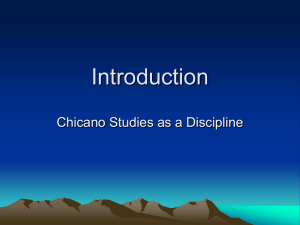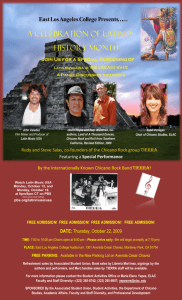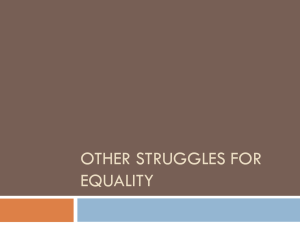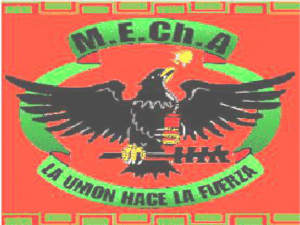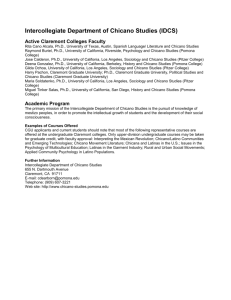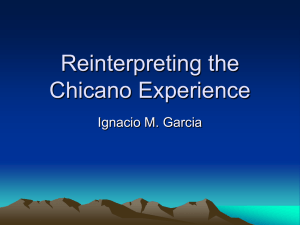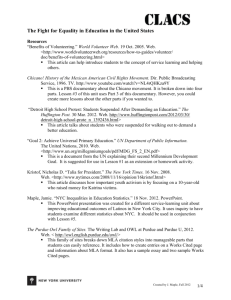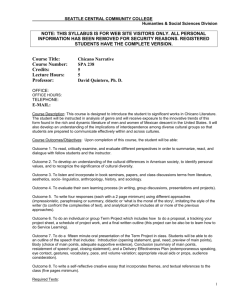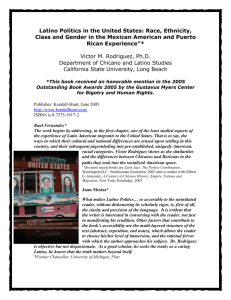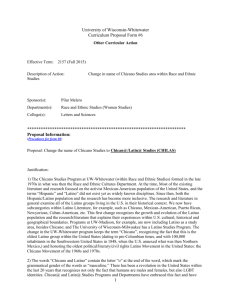university of california research grants for librarians program
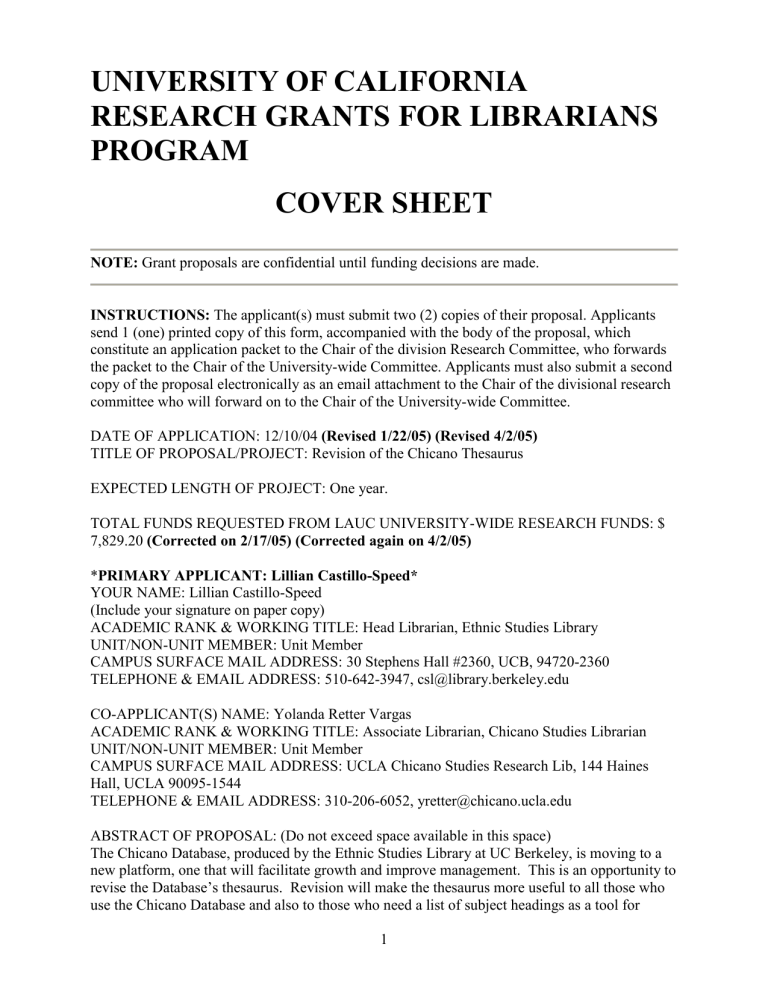
UNIVERSITY OF CALIFORNIA
RESEARCH GRANTS FOR LIBRARIANS
PROGRAM
COVER SHEET
NOTE: Grant proposals are confidential until funding decisions are made.
INSTRUCTIONS: The applicant(s) must submit two (2) copies of their proposal. Applicants send 1 (one) printed copy of this form, accompanied with the body of the proposal, which constitute an application packet to the Chair of the division Research Committee, who forwards the packet to the Chair of the University-wide Committee. Applicants must also submit a second copy of the proposal electronically as an email attachment to the Chair of the divisional research committee who will forward on to the Chair of the University-wide Committee.
DATE OF APPLICATION: 12/10/04 (Revised 1/22/05) (Revised 4/2/05)
TITLE OF PROPOSAL/PROJECT: Revision of the Chicano Thesaurus
EXPECTED LENGTH OF PROJECT: One year.
TOTAL FUNDS REQUESTED FROM LAUC UNIVERSITY-WIDE RESEARCH FUNDS: $
7,829.20 (Corrected on 2/17/05) (Corrected again on 4/2/05)
* PRIMARY APPLICANT: Lillian Castillo-Speed*
YOUR NAME: Lillian Castillo-Speed
(Include your signature on paper copy)
ACADEMIC RANK & WORKING TITLE: Head Librarian, Ethnic Studies Library
UNIT/NON-UNIT MEMBER: Unit Member
CAMPUS SURFACE MAIL ADDRESS: 30 Stephens Hall #2360, UCB, 94720-2360
TELEPHONE & EMAIL ADDRESS: 510-642-3947, csl@library.berkeley.edu
CO-APPLICANT(S) NAME: Yolanda Retter Vargas
ACADEMIC RANK & WORKING TITLE: Associate Librarian, Chicano Studies Librarian
UNIT/NON-UNIT MEMBER: Unit Member
CAMPUS SURFACE MAIL ADDRESS: UCLA Chicano Studies Research Lib, 144 Haines
Hall, UCLA 90095-1544
TELEPHONE & EMAIL ADDRESS: 310-206-6052, yretter@chicano.ucla.edu
ABSTRACT OF PROPOSAL: (Do not exceed space available in this space)
The Chicano Database, produced by the Ethnic Studies Library at UC Berkeley, is moving to a new platform, one that will facilitate growth and improve management. This is an opportunity to revise the Database’s thesaurus. Revision will make the thesaurus more useful to all those who use the Chicano Database and also to those who need a list of subject headings as a tool for
1
subject access to Chicano/Latino materials. The current project seeks to update the Chicano
Thesaurus in two subject areas: 1) The experience of non-Chicano Latina/os in the U.S.; and 2)
The experience of Lesbian/Gay/Bisexual/Transgendered (LGBT) Latina/os in the U.S. This project will also develop a general methodology to revise the remainder of the thesaurus and to flexibly incorporate future headings and concepts.
DOES THE PROPOSAL REQUIRE ANY OF THE FOLLOWING:
USE OF UC LIBRARY FACILITIES OR OTHER SITE(S) REQUIRING PRIOR
APPROVAL? (YES/NO___?) NO
IF YES, INCLUDE BELOW SIGNATURE AND POSITION OF PERSON
AUTHORIZED TO PERMIT USE OF FACILITIES
_______________________________________________________
RELEASE TIME (YES/NO) NO
IF YES, INCLUDE SIGNATURE (S) OF PERSON(S) AUTHORIZED TO
APPROVE RELEASE TIME ON PAPER COPY OF APPLICATION:
__________________________________________________________
USE OF HUMAN SUBJECTS? (YES/NO) NO
IF YES, ATTACH APPROPRIATE UNIVERSITY FORM TO PAPER
APPLICATION FORM.
LIST ANY PREVIOUS RESEARCH GRANT PROPOSALS (DIVISIONAL &
UNIVERSITY-WIDE) FROM THIS PROGRAM THAT HAVE BEEN AWARDED TO
THE PRIMARY APPLICANT OR CO-APPLICANTS BY TITLE, INCLUDE DATE
OF COMPLETION AND AMOUNT FUNDED. “Chicano Periodical Literature Pre-1982 Non-
Chicano Journals,” completed in 1989, $7,303.00. Co-applicants: Castillo-Speed and Richard
Chabran.
BUDGET SUMMARY
Note: This Budget Summary should be based on the detailed statement from the body of your proposal (part 5). Do not include budget items funded by sources other than LAUC Statewide
Research Funds in this Summary.
TOTAL AMOUNT REQUESTED FROM LAUC STATEWIDE RESEARCH FUNDS:
$ 7,829.20
TOTAL AMOUNT REQUESTED FROM LAUC DIVISIONAL RESEARCH FUNDS:
OTHER FUNDING OBTAINED OR EXPECTED (AMOUNT AND SOURCE):
2
FISCAL YEAR OF APPLICATION: 2004-2005
NEW PROJECT? (YES/NO): YES
SUPPLEMENTAL FUNDING? (YES/NO): NO
SALARIES: 2 Library School Students: $6,004
TOTAL SALARIES: $ 6,004
SUPPLIES:
TOTAL SUPPLIES: $
TRAVEL:
TOTAL TRAVEL: $ 575.20
OTHER EXPENSES: Programming: $750.00
Software: $300.00
Honorarium: $200.00
TOTAL OTHER EXPENSES: $ 1,250.00
TOTAL REQUESTED FROM LAUC STATEWIDE RESEARCH FUNDS: $ 7,829.20
LAUC Proposal: Update and Revision of the Chicano Thesaurus
December 10, 2004 (Revised January 22, 2005)(Revised April 2, 2005)
Submitted by Primary Applicant Lillian Castillo-Speed (UCB) and Co-Applicant Yolanda
Retter Vargas (UCLA)
SUMMARY
The Chicano Database is a unique access tool to information about the Chicano experience.
Produced by the Ethnic Studies Library at UC Berkeley, the Database has been available to all
UC campuses through the California Digital Library for over eight years. Currently, it is moving to a new platform, one that will allow an increase in the rate of growth, provide better management tools and build the infrastructure for future improvements, such as full-text, access to images, and more collaboration between the Chicano/Latino collections in the UC system.
This new platform will be most effective if we also begin to revise the database's thesaurus.
Revision will make the thesaurus more useful in print and online to all those who use the
Chicano Database and also to those who need a list of subject headings as a tool for subject access to Chicano/Latino materials.
The current project seeks to update the Chicano Thesaurus in two subject areas:
3
1. The experience of non-Chicano Latina/os in the U.S.;
2. The experience of Lesbian/Gay/Bisexual/Transgendered (LGBT) Latina/os in the U.S.
This project will also develop a general methodology to revise the remainder of the thesaurus and to flexibly incorporate future headings and concepts.
THE NEED FOR REVISION
The first edition of the Chicano Thesaurus was produced in 1979 and was published jointly by the Chicano Studies Library Publications Unit at UC Berkeley and the Colección Tloque
Nahuaque of the University Library of UC Santa Barbara. The thesaurus was a collaborative project of the Committee for the Development of Subject Access to Chicano Literature and most of the committee members worked for the University of California. Their experiences as information providers led them to identify a need for more effective and direct access to materials that recorded the Chicano experience.
In the early 1980s the dream of providing subject, author and title access to the exploding literature on the Chicano experience was realized with the publication of the Chicano Periodical
Index (CPI). The Chicano Thesaurus was developed a few years prior to the CPI as an access tool. The Chicano Periodical Index later became the Chicano Index , reflecting the inclusion of books and chapters in anthologies as well as journal articles. In 1990 the Chicano Database on
CD-ROM was the first ethnic studies database to be published in CD-ROM format. In 1996, the
Chicano Database became available through Research Libraries Group, Inc. as an online database and is now subscribed to by research institutions throughout the United States. On May
24, 1990, The Library of Congress assigned the code “cht” to the Chicano Thesaurus. It is to be used in subfield ≠2 of 6XX subject heading fields.
As the number of citations in the database grew and as the technical means of access improved, the development of the thesaurus remained somewhat static. One updated version of the thesaurus was published in the fourth volume of the Chicano Periodical Index (1987). Although in-house changes were made and incorporated into the computer program that maintained the
Chicano Database, the task of re-examining, re-evaluating, and revising the thesaurus and publishing a new edition took second place to the work of adding more citations to the database.
Up to now the work of adding citations to the database has been slowed down by an old maintenance system that was originally designed for the production of a print index. The new system will be geared toward electronic output and is being designed for flexibility, ease of use and a faster rate of growth. The transition will take place during the early spring of 2005.
Since the 1980's the field of Chicano Studies has changed dramatically. Indexers and users of the database have had to stretch the meanings of existing terms, use terms that are considered old-fashioned and even demeaning, and have had to use one general term when a more specific term would have been much more accurate. For example, the term “Homosexuality” has been used to cover all aspects of this complex and varied topic. The term itself is rather clinical and does not reflect current usage in Lesbian/Gay/Bisexual/Transgendered Studies. Terms such as
“Lesbians” and “Transgendered” must be added and the entire concept of gender must be examined. Another issue is the determination of the correct terminology for various groups of
Latin American immigrants. For example, immigrants from El Salvador may be called:
El Salvadorans (3530 Google hits)
Salvadorans (55,300 Google hits)
4
Salvadoreños (4690 Google hits)
Salvadoreans (3460 Google hits)
Salvadorians (5510 Google hits)
Salvadoran Americans (325 Google hits)
A search on Google on December 1, 2004 for each of the above terms indicated that they are all in common use in both informal and formal documents, including newspaper articles, government reports and websites, and academic journal articles.
To preserve the cultural uniqueness and usefulness of the thesaurus, we want to use terms that best describe cultural and political experience and also accurately reflect what members of the groups call themselves. The “English Language” term or the Library of Congress term, may not necessarily be the best one for the purposes of precise access to the ethno-cultural experiences the database encompasses.
New terms are needed to replace outmoded terms, and new concepts must be added in order to provide access to new subject areas.
We have identified two specific subject areas that we wish to address at this time. These are important areas that were not envisioned by the committee that originally compiled the thesaurus:
1. Non-Chicano Latina/os in the United States (e.g., Cuban Americans, Salvadoran
Americans, Puerto Ricans, Dominican Americans, Guatemalan Americans, etc.)
2. Lesbian/Gay/Bisexual/Transgendered (LGBT) Latina/os in the United States.
Furthermore, as we focus on these two areas we will review the entire structure of the thesaurus.
While a complete update is beyond the scope of the current proposal, the work on these areas will test the viability of the structure in practical rather than in theoretical terms. The results and findings will be the basis for a future project to thoroughly update the entire thesaurus.
Subject Areas for Future Development
Recently, the California Cultures project incorporated the Chicano Thesaurus as a means to provide access to Chicano/Latino images. There is a great need for vocabulary to provide access to images (art, photographs, etc). After this round of additions on non-Chicano Latinos and
LGBT Latinos, the Chicano Thesaurus Project proposes to add new capabilities by incorporating subject headings for Chicano/Latino images and by working collaboratively with others to continue to develop other subject and form headings.
DESIGN AND METHODOLOGY
Although the two applicants are subject experts in Chicana-o/Latina-o Studies, and one is a subject expert in LGBT Studies, there is a need for advice and information from others. An advisory committee of experts in thesaurus construction, terminology, and user needs will be consulted. Thesaurus expert Ellen Greenblatt will give the co-applicants an overview of factors to consider and some training and will critique their methodology. We will review current ANSI thesaurus standards, scan the library literature, and look at current thesauri, e.g., the Hispanic
American Periodicals Index thesaurus, the EBSCO thesauri, the ERIC thesaurus, among others.
Several hundred test citations related to the two targeted areas will be selected and added to the
Chicano Database. From this process will emerge new subject terms and relationships between
5
terms. The structure of the thesaurus will be tested and re-examined. The overall results will be studied and recommendations will be made for building a new overall thesaurus structure.
After the methodology is refined, the co-applicants will divide the work in supervising the search for relevant test citations from journals, books, and other materials at both the UCLA and UCB campuses and through online sources. Two graduate students will be hired to help with the gathering of citations, with literature searches, with indexing, with data entry, and with other tasks as needed. They will be hired from the UCLA Library School and/or the UCB School of
Information Management Studies. They will input the citations in the Chicano Database in editorial mode (that is, they will not be made available for public use for the time being.) During the process of indexing these citations, the two applicants and the students will use the Chicano
Thesaurus but will also consult other thesauri and the natural language used in the document itself to think of as many relevant terms as possible. This list of terms will be the basis for the new sections of the thesaurus.
Throughout this process of gathering terms, the applicants will consult often with the advisory committee. This new list of terms will be added to the Chicano Thesaurus using Multi-Tes, a commercial software package for creating and maintaining thesauri. The UCLA site will install this software for the use of the UCLA applicant and the library school student or students at
UCLA. The UCB site already has the software. At this point the two applicants will establish relationships among the terms, using the current framework of Broad Terms (BT), Narrower
Terms (NT), Related Terms (RT), and Scope Notes (SN).
The advisory committee will evaluate the results of this first draft and a new draft will be prepared. Using these new draft thesaurus sections, another test set of pertinent citations will be indexed and added to the Chicano Database in editorial mode. Members of the advisory committee will test the draft sections by indexing some sample citations. The co-applicants and the advisory committee will evaluate the results of these tests and finalize these sections in the thesaurus. The first set of test citations will be re-indexed using the new sections and then all the test citations generated by the project will be moved from editorial mode to production mode.
The final task of the project will be to prepare a set of recommendations for revising and updating the entire thesaurus.
BUDGET
Personnel
Two Graduate Student Researchers (Step 2)
15.10/hr.* x 400 hours = $6,004
Travel
Ellen Greenblatt's travel from Denver to Los Angeles to train the Co-Applicants = $259.20
(roundtrip)
UCB Applicant's travel from Oakland to Los Angeles to receive training from Ellen
Greenblatt = $158 (roundtrip)
UCLA Applicant’s travel from Los Angeles to Oakland to receive training on Multi-Tes and new Chicano Database = $158 (roundtrip)
Honorarium for Ellen Greenblatt = $200
Programming Services
Adding Ability to Remotely Add Citations to Chicano Database
6
$50/hour x 15 hours** = $750.00
Software
Multi-Tes software package for UCLA site = $300.00
* This salary can be justified due to the fact that the student workers will be required to have some previous training or coursework in indexing or cataloging. The project does not allow time for training in these basic skills although specific training in using the Chicano Thesaurus will be given.
** Estimate of hours was given by programmer who is currently transferring the Chicano
Database to a new platform. He will be the programmer on the thesaurus project as well. The number of hours required could be less than 15; however at the time of the proposal submission, the programmer was considering several options as to how this task could be accomplished and so did not have a more definite projection. He is a private contractor who has several years of professional experience working with the non-profit group sector, especially through a group called CompuMentor that matches non-profits to affordable programmers.
Budget Total: $7,829.20
PERSONNEL
Two Co-Applicants: Yolanda Retter Vargas (UCLA) and Lillian Castillo-Speed (UCB).
Two Library School Students Hired as Graduate Student Researchers.
Advisory Committee: Norma Corral, tatiana de la tierra, Karin Duran, Ellen Greenblatt,
Bhagirathi Subrahmanyam, and Elva Yañez. With the exception of Ellen Greenblatt, the members of the Advisory Committee are participating without monetary compensation.
TIMETABLE
July-August 2005
Literature review; establishment of Advisory Committee; preliminary consultation with
Advisory Committee through phone and email; hire library school students; training by Ellen
Greenblatt at UCLA.
September 2005
Set up website or other means that will allow remote input from UCLA to the Chicano Database and provide access to a common thesaurus version. Gather test citations.
October-November 2005
Training at UCB on Multi-Tes and the new Chicano Database. Index test citations and add to
Chicano Database. Add new terms to Multi-Tes.
December 2005-January 2006
Send terms to Advisory Committee for evaluation.
February 2006
Gather and index second set of test citations using new sections of thesaurus. Ask Advisory
Committee to index sample citations using the new sections.
March 2006
Evaluate results of second test. Consult with Advisory Committee.
7
April-May 2006
Finalize new sections in thesaurus. Prepare outline of steps for updating entire thesaurus. Reindex first set of test citations. Post results on Ethnic Studies Library website. Send website
URL of revised thesaurus to all subscribers to the RLG version of the Chicano Database. Ask the California Digital Library to add to the Chicano Database interface a convenient link to the thesaurus for UC users. Ask RLG to add a link to the thesaurus on their website
( http://www.rlg.org/ ). Send press release on results of project to relevant outlets, e.g., the electronic lists of REFORMA, the National Association for Chicana and Chicano Studies, and the Ethnic Materials Information Exchange Roundtable of ALA.
BACKGROUND DOCUMENTS
Chicano Thesaurus (current online version): http://clnet.sscnet.ucla.edu/thesaurus
Castillo-Speed, Lillian, “The Usefulness of the Chicano Thesaurus” in Biblio-Política: Chicano
Perspectives on Library Service in the United States
. Edited by Francisco García-Ayvens and
Richard Chabrán. Berkeley: Chicano Studies Library Publications Unit, 1984.
ADVISORY COMMITTEE BIOGRAPHICAL INFORMATION
Norma Corral
Librarian for Chicana/o Studies, American Indian Studies, Asian American Studies
UCLA YRL-Collections, Research & Instructional Services Department
Norma Corral has been a reference librarian in the UCLA Charles E. Young Research Library
Reference Department (now Collections, Research & Instructional Services) since 1979. Since
1992 she has been the Reference Collection coordinator. Her subject liaison responsibilities currently include Chicana/o Studies, Asian American Studies and American Indian Studies. The
Reference Department of the UCLA Library houses a collection of over 50,000 volumes, primarily in the social sciences and humanities, and serves as a central reference point for UCLA faculty, students, and staff. As a reference librarian she assists library users to navigate through the variety of databases they have access to through the California Digital Library (CDL) and locally through the UCLA Library. She has recently been selected to be liaison to CDL for the
Chicano Database. She worked on the initial creation of the Chicano Database as an indexer. In
2001 Ms. Corral was the recipient of the LAUC-LA Librarian of the Year Award “in recognition of exceptional contributions to librarianship and to the teaching and research missions of
UCLA.” tatiana de la tierra tatiana de la tierra is the Information Literacy Librarian at the University of Buffalo. She has an
MLS from the University of Buffalo and a Master of Fine Arts in Creative Writing from the
University of Texas at El Paso. She is a published author and her research interests include subject headings for ethnic and sexual minorities and bibliographic compilation of materials by and about gay, lesbian, queer Latinos and Latinas in the U.S.
8
Karin Duran
Karin Durán holds a Master’s in Library Science and a Ph.D. in Library and Information
Management from the University of Southern California. She has been employed at California
State University, Northridge since 1972 as a Reference Librarian, Cataloger, and Bibliographer.
She has also served as a Lecturer in the Chicana/o Studies Department where she developed and teaches “Introduction to Research Methods in Chicana/o Studies,” a three-unit class required of all department majors. Her publications include extensive bibliographies. She was indexer for the Chicano Periodical Index from 1981-1989, and contributed to Biblio-Política: Chicano
Perspectives on Library Service in the United States.
Honors include the Outstanding
Achievement Award from the CSU Northridge La Raza Alumni Association, and the Service to
Society Recognition from the CSU Northridge Alumni Association. Included in
Quién Es Quién and National Register of Hispanic American Area Specialists . Also, honored by the Human
Relations Commission of the City of Los Angeles as a Bicentennial Woman.
Ellen Greenblatt
Ellen Greenblatt is currently Associate Dean of Access, Collections, and Technical Services at
Auraria Library, University of Colorado at Denver and Health Sciences Center. Her primary background is in cataloging and authority control, and her previous library positions include
Catalog Editor at the State University of New York at Buffalo and Romance Languages Team
Leader at Princeton University. At the University of Denver she earned an as well as a master’s degree in history and another master’s degree in archival administration. She has co-compiled five thesauri, most notably the thesaurus for the EBSCO GLBT Life database.
Bhagirathi Subrahmanyam
Bhagirathi Subrahmanyam is an Assistant Professor, School of Library and Information Science at Columbus site, Kent State University. Her areas of specialization are classification, metadata and thesaurus construction. She was an original member and now a consultant for the American
Indian Studies Center. She is currently a co-principal investigator of NSF funded project (Award
#0333572) titled “Quality analysis of Metadata records in the NSDL Metadata repository.” She received her Ph.D. from UCLA.
Elva Yañez
Elva Yañez was one of the original collaborators on the development of the Chicano Thesaurus.
She received her MLS in Library and Information Management from the University of Southern
California. Ms. Yañez worked in research and academic libraries establishing specialized document collections and related bibliographic databases, and overseeing the creation of thesauri in the areas of alcohol policy and tobacco control. She made useful and critical suggestions regarding the original Chicano Thesaurus. Ms. Yañez has worked in the field of public policy for the past 15 years. She is currently Director of Local Government Relations at the Trust for Public
Land in Los Angeles.
********************************************************************
Postscript on the Availability of the Chicano Database
As a result of the Senate Concurrent Resolution 43 funding in the late 1980s and early 1990s, both Gary Lawrence and Dennis Smith of the Office of the President became aware of the
Chicano Periodical Indexing Project and the CD-ROM version that had been released in 1990.
As a way of complying with the imperative of SCR-43, which, in part, encouraged the University
9
of California to add and catalog more materials on Latinos, they became involved in supporting an effort to make the Chicano Database available online to all of UC. At that time, Lawrence,
Smith, Richard Chabran and Lillian Castillo-Speed met with staff at DLA (Division of Library
Automation—precursor to the California Digital Library) and requested that they include the
Chicano Database as a separate database on MELVYL. The answer was no, but Lawrence and
Smith supported the idea of the then Chicano Studies Library initiating a contract with Research
Libraries Group, Inc. to distribute the database on a royalty basis. Gary Lawrence was especially helpful with this and in 1996 the contract with RLG was signed. RLG’s Eureka interface is currently the only public user interface that the Chicano Database has. The CD-ROM version, which had its own interface, is no longer being published.
The RLG version of the Chicano Database is available to any institution that wants to subscribe, not just academic libraries. Current subscribers include several public libraries. It is a selfsustaining effort with royalties helping to defray the costs of development and maintenance. The database manager has gone to great lengths to make sure that it is affordable to as many as possible, whether print, CD-ROM, or online. If the Chicano Database were moved to a platform at CDL, then there would have to be some kind of funding involved to pay for its maintenance.
If CDL ever has this kind of funding then it would be feasible for the Chicano Database to break its exclusive contract with RLG and become a CDL-sponsored database.
Lillian Castillo-Speed Resume
Ethnic Studies Library
30 Stephens Hall #2360
University of California
Berkeley, CA 94720-2360
Phone: 510-642-3947
Fax: 510-643-8433
Email: csl@library.berkeley.edu
Areas of Specialization
Indexing, database management, publishing, Chicano Studies and Ethnic Studies bibliography, Latina literature.
Education
●
●
●
●
La Puente High School, La Puente, CA, 9/63 to 6/67, HS Diploma
University of California, Riverside, 9/67 to 6/71, B.A. in English
California State University, Long Beach, 9/73 to 12/76, 36 graduate units in English
Library and Information Studies
●
School of Library and Information Studies, UC Berkeley, 9/81 to 3/83, Master’s degree in
Western Archives Institute, two-week training, 6/93, Certificate
Professional Experience
●
Reference Intern, Latin American Library, Oakland, CA, 9/82 to 10/1/84
●
Librarian Specialist Cataloger, Sutro Project, California Spanish Language Database, Oakland,
CA, 9/20/83 to 10/1/84
●
●
Librarian and Library Coordinator, Chicano Studies Library, UC Berkeley, 10/1/84 to 7/1/91
Head Librarian and Chicano Studies Librarian, Ethnic Studies Library, UC Berkeley, 7/1/91 to the present
Professional Memberships
National Association of Chicana and Chicano Studies (NACCS)
10
REFORMA, National Association to Promote Library and Information Services to the Spanish Speaking
Bibliotecas Para La Gente, San Francisco, California
Mujeres Activas en Letras y Cambio Social (MALCS)
American Library Association
Publications
Contributor, “Chicano Sources” section of Guide to Ethnic Sources at UC Berkeley, 1973-1983 . Edited by Mark Goniwiecha, Kyung-Hee Choi, and Francisco García-Ayvens. Berkeley: Chicano Studies
Library Publications Unit, 1983.
Author, “The Usefulness of the Chicano Thesaurus” in Biblio-Política: Chicano Perspectives on Library
Service in the United States.
Edited by Francisco García-Ayvens and Richard Chabrán. Berkeley:
Chicano Studies Library Publications Unit, 1984.
Author, Two book reviews in Lector , a journal published by the California Spanish Language Database,
1984.
Editor, with Francisco García-Ayvens and Richard Chabrán
, Chicano Periodical Index (ChPI): A
Comprehensive Subject, Author, and Title Index for 1982-83 . Berkeley: Chicano Studies Library
Publications Unit, 1985.
Managing Editor , Arte Chicano: A Comprehensive Annotated Bibliography of Chicano Art, 1965-1981 .
Compiled by Shifra M. Goldman and Tomás Ybarra-Frausto. Berkeley: Chicano Studies Library
Publications Unit, 1985.
Bibliographer, “Annotated Bibliography,”
La Red/The Net: Newsletter of the National Chicano Council on Higher Education , No. 93 (January-February, 1986), p. 14-17.
Author, “Chicana/Latina Literature and Criticism: Review of Recent Books,”
Women Library Workers
Journal (September 3, 1987).
Editor, with Francisco García-Ayvens and Richard Chabrán,
Chicano Periodical Index (ChPI): A
Comprehensive Subject, Author and Title Index for 1984-86 . Berkeley: Chicano Studies Library
Publications Unit, 1987.
Co-author with Richard Chabrán, “Latinos and the University of California Libraries.” In The Challenge:
Latinos in a Changing California by the University of California SCR43 Taskforce . Riverside, CA: UC-
MEXUS, 1989.
Editor, with Richard Chabrán and Francisco García-Ayvens, Chicano Periodical Index (ChPI): A
Comprehensive Subject, Author and Title Index for 1987 . Berkeley: Chicano Studies Library Publications
Unit, 1988.
Editor, with Richard Chabrán and Francisco García-Ayvens, Chicano Index . Berkeley: Chicano Studies
Library Publications Unit, 1989-93.
Bibliographer, “Chicana Studies: A Selected List of Materials since 1980.” Frontiers: A Journal of
Women Studies , Vol. 11, no. 1 (January, 1990).
Editor and Database Manager, The Chicano Database on CD-ROM . Berkeley: Chicano Studies Library
Publications Unit [changed to Ethnic Studies Library Publications Unit in 1997], 1990-2000.
Editor and Database Manager, The Chicano Database, 1990-
Author, “The Chicano Database and the CD-ROM Experience.” In CD-ROM in the Library: Today and
Tomorrow . Edited by Mary Kay Duggan. Boston, MA: G.K. Hall, 1990.
Author, “Libraries Are Not Neutral in Ethnic Studies Debate,” REFORMA Newsletter (Summer, 1991).
Compiler, The Chicana Studies Index: Twenty Years of Gender Research, 1971-1991 . Berkeley: Chicano
Studies Library Publications Unit, 1992.
Bibliographer, “Chicana Studies: An Updated List of Materials, 1980-1991.” In Chicana Critical Issues.
Edited by Norma Alarcón, et al. Berkeley: Third Woman Press, 1993.
Interviewee in Notable Hispanic American Women , edited by Diane Telgen and Jim Kamp. Detroit, MI:
Gale Research, Inc., 1993.
Co-author with Rafaela Castro and Carol Yates Imah, “Voices of Diversity in University of California
Libraries: Impact, Initiatives, and Impediments for Cultural and Racial Equity.” In Diversity and
Multiculturalism in Libraries . Vol. 30 of Foundations in Library and Information Science . Greenwich,
CT: JAI Press, 1994.
Editor, Latina: Women’s Voices from the Borderlands . New York: Simon and Schuster, 1995.
11
Author, “Ordinary Gifts.” In I’ve Always Meant to Tell You: Letters to Our Mothers . Edited by
Constance Warloe. New York: Simon and Schuster, 1997.
Series Editor, A Sense of Place: Rudolfo A. Anaya: An Annotated Bio-bibliography . By César A.
González and Phyllis S. Morgan. Berkeley: Ethnic Studies Library Publications Unit, 2000.
Editor (with the REFORMA National Conference Publications Committee), The Power of Language/El poder de la palabra.
Englewood, CO: Libraries Unlimited, 2001.
Awards Received
Edith M. Coulter Scholarship, 1981
Listing in Notable Hispanic American Women, Gale Research, Inc., 1993
REFORMA Librarian of the Year Award, 1996
Yolanda Retter Vargas - Resume
E-mail: yretter@chicano.ucla.edu
Born New Haven, Connecticut, grew up in El Salvador.
Bilingual (English/Spanish).
EDUCATION:
PhD - University of New Mexico (American Studies), 1999.
MSW - UCLA School of Social Welfare, 1987.
MLS - UCLA School of Library & Information Science, 1983.
BA - Pitzer College (Claremont, CA) Major: Sociology, 1971.
Specialization in Archival Studies - UCLA Department of Information Studies (in progress).
PROFESSIONAL EXPERIENCE:
Information Management (partial)
2003-
CHICANO STUDIES LIBRARIAN. University of California, Los Angeles.
Responsible for managing a bilingual special collection focusing on the history and culture of Chicanos and of México. The collection includes books, films, prints, and journals and a growing archival collection of primary materials related to Chicano history.
2002-2003
SOCIAL WORK AND REFERENCE SERVICES LIBRARIAN. University of
Southern California. Provided reference assistance and bibliographic instruction, class and community presentations. Created and maintained subject-specific web site. Responsible for collection development.
1996-2000
REFERENCE LIBRARIAN. University of Southern California. Subject expertise: ethnic studies, lesbian/gay studies, history, biography, psychology, women's studies. Offered bibliographic instruction and faculty project assistance. Assisted with collection development assistance for humanities collection. 1996-1997; 1998-2000.
1996-current
COLLECTION MANAGER. The Lesbian Legacy Collection of the ONE/Gay and Lesbian Archives, Los
Angeles. Manage lesbian and women's history archive and collection. Responsibilities include: Collection development, database development, volunteer supervision, budget management, fundraising, reference assistance, web site management, oral history interviews. This is a part-time volunteer position.
1996-current
12
WEB SITES. Compiled and maintain the following web sites:
UCLA Chicano Studies Research Center Library, 2003-
[http://www.chicano.ucla.edu/library/]
The Lesbian History Project, 1996-
[http://www-lib.usc.edu/~retter/main.html],
The History of Peruvian Photography, 2001-
[http://www-lib.usc.edu/~retter/pelatam1.html],
Compiled the Women of Color web site for Pitzer College (1996).
1991
PROJECT COORDINATOR. County of Los Angeles Public Library.
Compiled the "Latino/a Biography" database, containing biographical information on Latina/os in the US and Latin America from 1492-1990.
1989-1991
LIBRARIAN. County of Los Angeles Public Library, Chicano Resource Collection.
Responsible for an ethnic, bilingual, special collection focusing on the history and culture of Chicano/as and México. Collection development and management, staff supervision, bibliographic instruction, development of educational materials, community outreach.
1988-
DEALER. Out-of-print books and vintage photographs on a variety of subjects.
1984-1985
LIBRARY DIRECTOR. Cleveland Chiropractic College. Responsible for management of small academic health library. Bibliographic instruction, budget planning and management, staff supervision, database searching, collection development.
CONSULTING AND EDITORIAL PANELS:
2003-
EDITORIAL PANELIST. Salem Press. LGBT essays project. Consult on lesbian and people of color content.
2003-
EDITORAL PANELIST. Alexander Street Press. Chicano Literature database.
2002-
DATABASE CONSULTANT. Lesbian and people of color content for LGBT
LIFE database produced by EBSCO Publishing.
TEACHING (partial):
2003
INSTRUCTOR. Professional development class sponsored by the USC
Latino Social Work Caucus: "Social Work Spanish for Spanish-Speaking Social Workers." Spring 2003.
2001
13
LECTURER. University of California, Los Angeles. Course taught:
"Adelante: History and Culture of Latina Lesbians in the U.S."
1995-1996
LECTURER. Pitzer College (Claremont, CA) Courses taught:
"Women of Color in the United States" (1996); "A History of a Social and Political Movement: The
Stonewall Family."
1992-1993
TEACHING ASSISTANT. University of New Mexico. Department of
American Studies. Courses Taught: "Contemporary Women of Color in the United States."
1990
LECTURER. San Jose/Fullerton Graduate Library School. Courses taught: "Resources in History, Philosophy and Political Science;" "Ethnic Resources & Collections."
LECTURES, PRESENTATIONS (selected)
“A History of Lesbian Activism in L.A.” UCLA Lesbian Gay Bisexual Transgender Studies M116. James
Schulz, instructor. May, 2004.
“Chicano Studies: Information Resources and Issues.” UCLA Information Studies 245. Mary Niles
Maack, instructor. August, 2004
“LGBT Resources” UCLA Information Studies 227, Richard Chabrán.
October, 2004.
LGBT issues in social work. Class presentations. USC School of Social Work, 2002-
Invited lecture: Servicios de Salud Mental para Sobrevivientes y
Familiares de Víctimas de Desastres Aéreos. El 1er Congreso
LatinoAmericano de Psicología en emergencias y desastres. Lima,
Perú, Noviembre, 2002.
"La Vida y Obra de Max T. Vargas." Panelist, Centro de la
Fotografía, Lima, Perú. November, 2002.
"Tras los Pasos de Max T. Vargas, fotógrafo." Paper presented at the Congreso de Historia de la Fotografía Latinoamericana. Buenos
Aires, November, 2001.
"Oral history and lesbian history." Paper presented at the
Southwest Oral History Association Conference, Palm Springs, April, 1999.
Oral history workshop. Latina Lesbian Oral History Project
Community Forum, Los Angeles, September, 1997.
"Issues of Native Research and Lesbian Ethnohistory."
Paper presented at Reclaiming Voice: Ethnographic Inquiry and
Qualitative Research in a Postmodern Age Conference. University of
Southern California, Los Angeles, April, 1997.
"Monocultural Library Education in a Multicultural Society"
Keynote speech for the Latino Librarian Organization. CLA
Conference, San Diego, May, 1991.
14
"Oprah Winfrey Show" Panel on lesbians. February, 1988.
"Lesbian history." Slide show. Various locations and dates,
1997-present.
PUBLICATIONS (selected)
Books:
Co-editor Documentary History of The Struggle for Gay and Lesbian
Rights in the United States. Walter Williams and Yolanda Retter, eds. Greenwood Press, 2003.
Co-Editor Queers in Space:Communities, Public Places, Sites of
Resistance. Brent Ingram, Anne-Marie Bouthillette & Yolanda Retter, eds. Bay Press, 1997.
Articles, essays, book chapters:
Assigned entry "Amelia Robles." Salem Press (in progress).
Assigned entry ("Lesbian Separatism") in the Encyclopedia of Latinos and Latinas in the United States.
Oxford University Press (in progress).
Assigned entries ("Judy Baca," "Chrystos," "Jeanne Cordova," "Barbara Cameron") in the Encyclopedia of American Lesbian, Gay, Bisexual and Transgender History and Culture. Thomson/Gale, 2004.
"Californios in Nineteenth Century photographs." In Lost and Found: Rediscovering Early Photographic
Processes. Exhibition catalogue, Fisher Gallery, University of Southern California, 2001.
"Chicana Feminism" in Encyclopedia of Feminist Theories. Routledge Press, 2000.
"Anna Mae Wong, "Stonewall Rebellion," Varga Girl," Jane Addams," in the St. James Encyclopedia of
Popular Culture. St. James Press, 2000.
"Los Angeles, California," Teresa de la Parra," Elaine Noble," in The Encyclopedia of Lesbianism.
Bonnie Zimmerman editor. Garland
Publishing, 2000.
"Lesbian Activism in Los Angeles, 1970-1979." In Queer Frontiers.
Joseph Boone et al, eds. University of Wisconsin Press, 2000.
Periodicals:
"Lesbian History" (monthly column) The Lesbian News (Los Angeles), 1997-99.
"Nosotras, Las Otras" (monthly column) Hembra Newspaper (Albuquerque, NM), 1992-93.
Los Angeles Women's Yellow Pages. Co-founder, owner. 1978-1982.
Portucullis Magazine (Los Angeles) co-founder, 1972.
AWARDS
2003 Spirit Award from the USC Latino Social Work Caucus.
2002 Professional Development Award. University of Southern California. For travel to research and present paper in Perú.
2002 Visibility Award from The ONE Institute and Archives.
15
2002 Institute for the Study of Human Resources, Los Angeles. Book completion grant.
2000 Monette/Horwitz Trust Award ("For combating homophobia through research and writing").
2000 Institute for the Study of Human Resources research grant.
1998 Lambda Award for Queers in Space:Communities, Public Places, Sites of Resistance (Bay Press,
1997).
1997 Institute for the Study of Human Resources, Los Angeles. Dissertation completion grant.
1995 "Lifetime Achievement and Contribution to the Lesbian, Gay and Bi Community". Awarded by the
University of Southern California Graduate Lesbian, Gay, Bi Student Network at the "Queer Frontiers"
Conference, Los Angeles.
MEMBERSHIPS
Reforma. The National Association to Promote Library and Information Services Latinos, 2004.
MALCS (Mujeres Activas en Letras y Cambio Social). Also serve as the MALCS archivist.
16
